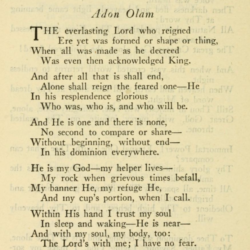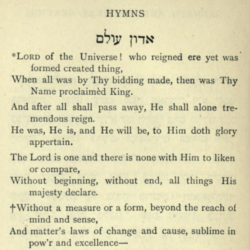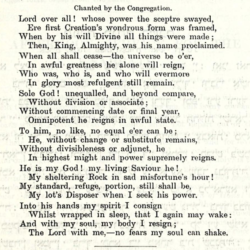TOGGLE COLUMNS (on/off):ADJUST COLUMN POSITIONS: select the column header cell and drag it where you want. show me!COPY INDIVIDUAL COLUMN(S): use CopyTables, a browser extension.
| Source (Hebrew) | Translation (English) |
|---|---|
אֲדוֹן עוֹלָם אֲשֶׁר מָלַךְ בְּטֶֽרֶם כׇּל־יְצִיר נִבְרָא׃ לְעֵת נַֽעֲשָׂה כְּחֶפְצוֹ כֹּל אֲזַי מֶֽלֶךְ שְׁמוֹ נִקְרָא׃ |
Lord of the world, he reigned alone While yet the Universe was naught. When by his will all things were wrought, Then first his sovran name was known. |
וְאַֽחֲרֵי כִּכְלּוֹת הַכֹּל לְבַדּוֹ יִמְלֹךְ נוֹרָא׃ וְהוּא הָיָה וְהוּא הֹוֶה וְהוּא יִֽהְיֶה בְּתִפְאֲרָה׃ |
And when the All shall cease to be, In dread lone splendour he shall reign. He was, he is, he shall remain In glorious eternity. |
וְהוּא אֶחָד וְאֵין שֵׁנִי לְהַמְשִׁיל לוֹ לְהַחְבִּירָה׃ בְּלִי רֵאשִׁית בְּלִי תַּכְלִית וְלוֹ הָעֹז וְהַמִּשְׂרָה׃ |
For he is one, no second shares His nature, or his loneliness; Unending and beginningless, All strength is his, all sway he bears. |
וְהוּא אֵלִי וְחַי גּֽוֹאֲלִי וְצוּר חֶבְלִי בְּיוֹם צָרָה׃ וְהוּא נִסִּי וּמָנוֹס לִי מְנָת כּוֹסִי בְּיוֹם אֶקְרָא׃ |
He is the living God to save, My rock while sorrow’s toils endure, My banner and my stronghold sure, The cup of life whene’er I crave. |
בְּיָדוֹ אַפְקִיד רוּחִי בְּעֵת אִישַׁן וְאָעִֽירָה׃ וְעִם רוּחִי גְּוִיָּתִי אֲדֹנָי לִי וְלֹא אִירָא׃ |
I place my soul within his palm, Before I sleep as when I wake, And though my body I forsake, Rest in the Lord in fearless calm. |
Adon Olam is a piyyut that became popular in the 15th century and is often attributed to Solomon ibn Gabirol (1021–1058) and less often to Sherira Gaon (900-1001), or his son, Hai ben Sherira Gaon (939-1038). The variation of the piyyut appearing here is the 10 line version familiar to Ashkenazi congregations. (There are also twelve, fifteen, and sixteen line variants found in Sepharadi siddurim.) The rhyming translation here by Israel Zangwill was transcribed from the Jewish Quarterly Review vol. 13 (January 1901), p. 321.
Source(s)


“אֲדוֹן עוֹלָם (אשכנז) | Adon Olam (rhyming translation by Israel Zangwill, 1901)” is shared through the Open Siddur Project with a Creative Commons Attribution-ShareAlike 4.0 International copyleft license.








Comments, Corrections, and Queries